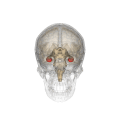Post-traumatic amnesia

Editor-In-Chief: Prab R Tumpati, MD
Obesity, Sleep & Internal medicine
Founder, WikiMD Wellnesspedia &
W8MD's medical weight loss NYC, sleep center NYC
Philadelphia medical weight loss and Philadelphia sleep clinics
| Post-traumatic amnesia | |
|---|---|

| |
| Synonyms | N/A |
| Pronounce | N/A |
| Specialty | N/A |
| Symptoms | Memory loss, disorientation, confusion |
| Complications | N/A |
| Onset | Immediately after traumatic brain injury |
| Duration | Minutes to weeks, depending on severity |
| Types | N/A |
| Causes | Traumatic brain injury |
| Risks | Motor vehicle accidents, falls, sports injuries |
| Diagnosis | Clinical assessment, Glasgow Coma Scale, neuropsychological testing |
| Differential diagnosis | Concussion, dementia, delirium |
| Prevention | N/A |
| Treatment | Supportive care, rehabilitation, cognitive therapy |
| Medication | N/A |
| Prognosis | Varies; can be full recovery or persistent memory issues |
| Frequency | Common in traumatic brain injury cases |
| Deaths | N/A |
Post-traumatic amnesia (PTA) is a state of confusion that occurs immediately following a traumatic brain injury (TBI) in which the injured person is disoriented and unable to remember events that occur after the injury. The person may be unable to state their name, where they are, and what time it is. When continuous memory returns, PTA is considered to have resolved. While PTA lasts, new events cannot be stored in the memory.
Causes[edit]
PTA is caused by a traumatic brain injury, such as a blow to the head. The length of time that PTA lasts can be an indicator of the severity of the brain injury. The longer the duration of amnesia, the more severe the injury is likely to be.
Symptoms[edit]
The main symptom of PTA is memory loss. This can be loss of memory for events before the injury (retrograde amnesia), or events after the injury (anterograde amnesia). Other symptoms can include confusion, disorientation, and agitation.
Diagnosis[edit]
Diagnosis of PTA is based on clinical assessment of the patient's ability to consistently form new memories. This is often done using the Galveston Orientation and Amnesia Test (GOAT), which assesses orientation to person, place, and time, and the ability to remember events since the injury.
Treatment[edit]
Treatment for PTA involves supportive care and rehabilitation. This can include occupational therapy to help the person manage daily activities, and cognitive rehabilitation to improve memory and other cognitive functions.
Prognosis[edit]
The prognosis for PTA depends on the severity of the brain injury. Most people with mild to moderate injuries recover fully, but those with severe injuries may have long-term problems with memory and cognition.
Post-traumatic_amnesia images[edit]
-
Hippocampus
-
Arginine vasopressin 3D model
-
Shell shock
-
Elderly Woman
See also[edit]
References[edit]
<references />
Ad. Transform your life with W8MD's Budget GLP-1 injections from $75


W8MD offers a medical weight loss program to lose weight in Philadelphia. Our physician-supervised medical weight loss provides:
- Weight loss injections in NYC (generic and brand names):
- Zepbound / Mounjaro, Wegovy / Ozempic, Saxenda
- Most insurances accepted or discounted self-pay rates. We will obtain insurance prior authorizations if needed.
- Generic GLP1 weight loss injections from $75 for the starting dose.
- Also offer prescription weight loss medications including Phentermine, Qsymia, Diethylpropion, Contrave etc.
NYC weight loss doctor appointmentsNYC weight loss doctor appointments
Start your NYC weight loss journey today at our NYC medical weight loss and Philadelphia medical weight loss clinics.
- Call 718-946-5500 to lose weight in NYC or for medical weight loss in Philadelphia 215-676-2334.
- Tags:NYC medical weight loss, Philadelphia lose weight Zepbound NYC, Budget GLP1 weight loss injections, Wegovy Philadelphia, Wegovy NYC, Philadelphia medical weight loss, Brookly weight loss and Wegovy NYC
|
WikiMD's Wellness Encyclopedia |
| Let Food Be Thy Medicine Medicine Thy Food - Hippocrates |
Medical Disclaimer: WikiMD is not a substitute for professional medical advice. The information on WikiMD is provided as an information resource only, may be incorrect, outdated or misleading, and is not to be used or relied on for any diagnostic or treatment purposes. Please consult your health care provider before making any healthcare decisions or for guidance about a specific medical condition. WikiMD expressly disclaims responsibility, and shall have no liability, for any damages, loss, injury, or liability whatsoever suffered as a result of your reliance on the information contained in this site. By visiting this site you agree to the foregoing terms and conditions, which may from time to time be changed or supplemented by WikiMD. If you do not agree to the foregoing terms and conditions, you should not enter or use this site. See full disclaimer.
Credits:Most images are courtesy of Wikimedia commons, and templates, categories Wikipedia, licensed under CC BY SA or similar.
Translate this page: - East Asian
中文,
日本,
한국어,
South Asian
हिन्दी,
தமிழ்,
తెలుగు,
Urdu,
ಕನ್ನಡ,
Southeast Asian
Indonesian,
Vietnamese,
Thai,
မြန်မာဘာသာ,
বাংলা
European
español,
Deutsch,
français,
Greek,
português do Brasil,
polski,
română,
русский,
Nederlands,
norsk,
svenska,
suomi,
Italian
Middle Eastern & African
عربى,
Turkish,
Persian,
Hebrew,
Afrikaans,
isiZulu,
Kiswahili,
Other
Bulgarian,
Hungarian,
Czech,
Swedish,
മലയാളം,
मराठी,
ਪੰਜਾਬੀ,
ગુજરાતી,
Portuguese,
Ukrainian






